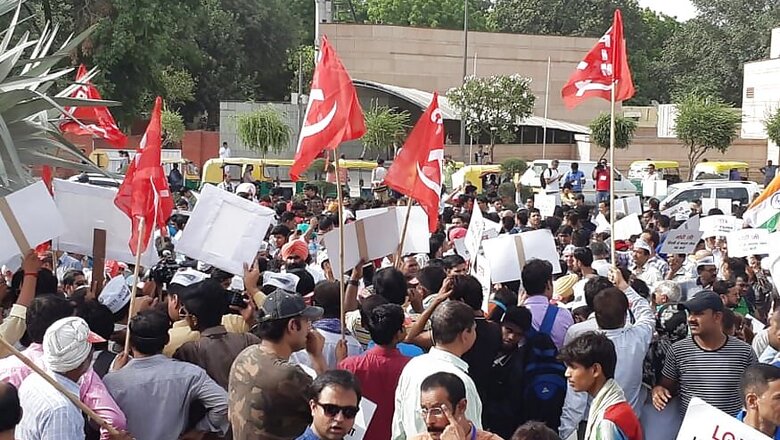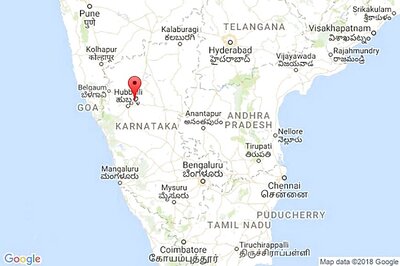
views
Over the last four decades the Communist Party of India (Marxist) has been busy discussing its archaic “political-tactical line” and its opposition to neo-liberal economic policies unmindful of the looming electoral nemesis for the sake of ideological purity.
Over a decade, the party has been vertically divided on its tactical line into two camps — one led by hardliner Prakash Karat, backed by the Kerala unit advocating an isolationist stand (read anti-Congress) and the other by pragmatist general secretary Sitaram Yechury calling for unity of all secular forces on the lines of erstwhile United Front to stop the BJP juggernaut.
As the comrades continue to squabble over tactics, the saffron tsunami has nearly wiped out the Red from the political map of India. The CPM’s Lok Sabha tally has plummeted to a historic low of just three seats in the 544-member House, a far cry from its highest tally of 43 in 2004.
Tamil Nadu saved the party from ignominy by winning two Lok Sabha seats; the third seat came from Kerala (out of 20), the party’s supposed bastion. The party drew a blank in West Bengal and Tripura, facing an existential crisis.
Ironically, the face-saver came from Tamil Nadu because the state unit of the CPM adopted a pragmatic approach and joined the DMK-Congress led alliance, whereas in Kerala and elsewhere the party continued with its traditional anti-Congressism.
In Kerala, a bad strategy led to the diversion of Hindu vote base associated with the CPM to the BJP and the Congress. Chief minister Pinarayi Vijayan’s muscular politics, arrogance and sloppy handling of the Sabarimala temple controversy antagonised a section of Hindus who voted for the saffron party (the BJP registered a substantial increase in its vote share) while liberal, progressive Hindus, who loathed Vijayan’s strong-arm tactics and Moditva, voted for the Congress; apparently the bruised Malayali ego is yet to forgive Prime Minister Narendra Modi for comparing God’s Own Country to Somalia.
The Hyderabad party Congress in April 2018 had endorsed Yechury line but in the subsequent Central Committee meeting, the party was divided on tactics – whether to embrace the Congress or not - with half of the state committees moving their suggestions to craft state-specific electoral strategy. As a corollary, the Telengana and Andhra committees worked out their own tactics deviating from the Hyderabad Congress line refusing to forge an electoral understanding with secular parties like the Congress, YSR Congress, TDP and TRS. The outcome was disastrous; the party was routed in both the Telugu states in the ensuing elections.
The CPM unit in Tamil Nadu, however, adopted a pragmatic approach adhering to Hyderabad spirit and bagged two Parliament seats. While Tamil Nadu has been the only silver lining amidst the gathering dark clouds on the political horizon, the party drew a blank in its bastions of West Bengal and Tripura and won a lone seat in Kerala.
The fact that the party had no problem in joining a coalition comprising the Congress in Tamil Nadu, in Telangana and Andhra the Congress is an anathema belies logic. The hardliners had grudgingly agreed to an understanding with the Congress in West Bengal after protracted in-house parleys but the alliance collapsed due to turf wars between local leaders over seat sharing.
The excuse for the Tripura Assembly defeat last year was that the Congress base shifted to the BJP, but now in West Bengal and Kerala the CPM base is shifting to the BJP. Unlike Bengal and Tripura where the CPM had to face formidable opponents like Trinamool Congress and the BJP, the rout in Kerala (despite having a government headed by a strong chief minister), is even more galling.
Party insiders blame the Kerala unit that dominated the politburo over the years and swayed the party’s all-India tactics for long, for the pathetic finale.
In fact, the CPM’s political bungling started in 1996 when hardliners, mainly from Kerala, sabotaged the possibility of the late Jyoti Basu becoming Prime Minister, a reactionary move that Basu termed “historical blunder”. The blunders since have only multiplied – whether preventing the then Lok Sabha Speaker Somnath Chatterjee from becoming President or withdrawing support to the Manmohan Singh government on an issue that did not find resonance with the ‘aam aadmi’.
The writing has been on the wall for some time but the smug politburo refused to read it. As against an all-time high of 43 (CPM) and 59 (Left Front) members in the 14th Lok Sabha (2004), the 17th Lok Sabha being constituted next week will have just five Left members, including two from the CPI.
In 2009, the LDF number was reduced to 16 and dipped to nine in 2014 while the CPM’s vote share plummeted to 3.28% from 5.33% in 2009 and now around 3%.
The party has been staring at a gradual decline beginning 2008 when it quit the UPA-I coalition protesting the Indo-US nuclear; in 2011 the newly minted Trinamool Congress ended 34 years of uninterrupted Marxist rule in West Bengal. Still, alarm bells did not ring and in 2016 the party lost even the main Opposition party status in West Bengal.
It is a sad commentary that when their critical intervention is needed to counterbalance the rising right-wing offensive, the Marxists are losing their fighting spirit.



















Comments
0 comment